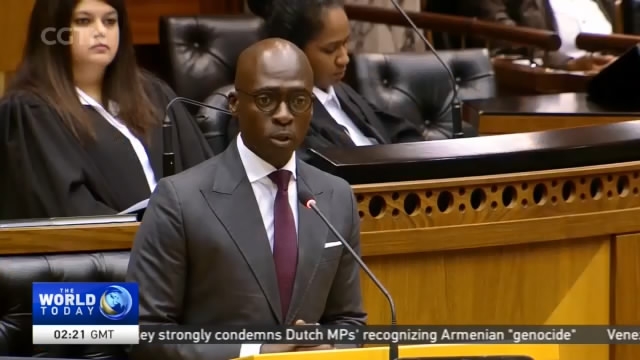
10:50, 23-Feb-2018
South Africa Budget Review: Mixed reactions to Gigaba's wide-ranging tax hikes

Moving to South Africa, where there's been mixed reaction to the planned budget. Finance Minister Malusi Gigaba introduced wide-ranging tax hikes to generate revenue. While the extra funds will help ease government debt burdens, they also make it a lot more expensive to live in South Africa. The cost of food, fuel, sugary drinks, alcohol, cigarettes, and even excise duties on golf balls are going up. Sumitra Nydoo has more.
Value added tax is going up for the first time in 25 years. From April everything, except for 19 items will cost 15% extra. That will help to plug part of the 4 billion dollar hole left by declining tax revenues. But it will empty the pockets of the poor.
ZWELINZIMA VAVI VICE CHAIRPERSON, MILLENNIUM LABOUR COUNCIL "This is a pro-business budget, it's anti-poor. It has been given a cherry on top to punish the poor, to rob them as Paul in order to pay Peter, the students who went out on the streets demanding free education. It is no movement forward because all it will do is to increase the gap between the rich and the poor."
DENNIS GEORGE GENERAL SECRETARY, FEDERATION OF S. AFRICAN UNIONS "If you take an average family that earn about R350 000 a year, the amount of money that they pay on taxes, it's extremely high if you look at Pay as You Earn, if you look at property taxes and now for the government to come, to now increase VAT from 14% is total unfair."
The rand held stable during and after the budget speech. The market seemed to be pleased with the Treasury's plans to cut spending, lower debt and raise revenues. Rating agencies have yet to comment.
LESIBA MOTHATA CHIEF ECONOMIST, ALEXANDER FORBES "I think this will be well received by ratings agencies because I think the are also commensurate expenditure cuts we've got to see. There's also a focus on economic reforms. So while they've increased taxes, this team from the National Treasury is equally aware that they need to create new revenue, a new economy to support those tax highs."
JABU MABUZA CHAIRPERSON, ESKOM "In the circumstances, to try and close that fiscal gap, you have to increase revenues, cut costs. So when you consider that 80% of the VAT income is paid by more affluent people and the zero rating of certain, basic foodstuff is supposed to obliterate a bit of that hardship and indeed the increase in the social grants."
The treasury is expecting the economy to grow by 1.5% in 2018 and 2.1% in 2019. It may be tough targets to achieve with South Africans having to pay more for everything while unemployment remains near record highs. SN CGTN CT SA.

SITEMAP
Copyright © 2018 CGTN. Beijing ICP prepared NO.16065310-3
Copyright © 2018 CGTN. Beijing ICP prepared NO.16065310-3